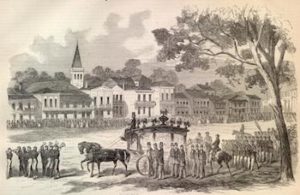
Andre Cailloux funeralSteven Ochs
*The birth of Andre Cailloux in 1825 is celebrated on this date. He was a Black businessman and soldier during the American Civil War.
Cailloux was born a slave on a plantation owned by Joseph Duvernay near Pointe a la Hache in Plaquemines Parish, Louisiana. When he was 5, his Master died, and he became the possession of his Master’s widow, who moved him and his parents to New Orleans. As a teenager, he was trained in cigar making and learned to read, possibly at the factory, where it was common to have a storyteller who read to workers as they rolled cigars.
At 21, Cailloux was emancipated and married Felicie Coulon, also recently freed. He adopted Felicie’s son, and the couple had four more children. He educated his two sons at a school run by local Black intellectuals. In 1852, Cailloux bought a piece of property for $200 at Prieur and Perdido streets. A few years later, he purchased a Creole cottage uptown on Baronne Street for $400. By 1860, he also owned a shop in Faubourg Marigny.
That same year, during the antebellum era in New Orleans, Cailloux joined the Friends of Order, which elected him secretary. Although there are no pictures of Cailloux, and he left no letters or journals, he does appear in the writings of others. By all accounts, he was trusted and well-liked, a good-looking man who participated actively in the social life of the Black Creole community and cut a handsome figure in his uniform. A boxer and horseman, he was known for his manners and character. He took pride in calling himself "the blackest man in New Orleans."
Many benevolent societies formed units in the Louisiana militia when the Civil War began. It was traditional for free people of color to offer military service to the government in power. They had done so since colonial times. They expected it, and it would have aroused suspicion had they declined. So Friends of Order became the Order Company in the Louisiana Native Guards, and Cailloux enlisted 100 men, including working slaves, runaway slaves, and free Black men. He was made their captain.
"The Confederates were nervous about the presence of Black troops," said historian Joseph Logsdon at the University of New Orleans. "They didn’t know what was on their minds. People living in a slave society have constant fears of a revolt." When New Orleans fell to the Union forces, the Native Guards disbanded. But when Union Gen. Benjamin Butler took the reigns of power in the city, he needed troops. He wasn’t going to find them among the white population of Louisiana, and he wouldn’t get any more from Washington. So he turned to the Native Guards, who offered their services. Cailloux’s company became the colored company, carrying the banner for the 1st Regiment. In most people’s minds, the fall of Post Hudson signaled a significant turning point in the war. It showed that Blacks were not just docile recipients of Father Abraham's favors but were active participants in their liberation and the defeat of slaveholders.
On May 27, 1863, General Nathaniel P. Banks launched a poorly coordinated attack on the well-defended, well-fortified Confederate positions at Port Hudson. As part of the attack, Cailloux was ordered to lead his company of 100 men in an almost suicidal assault against sharpshooting Confederate troops. Cailloux’s company suffered heavy casualties, but Cailloux, shouting encouragement to his men in French and English, led several increasingly futile charges. On his last charge, a Minié ball tore through his arm, which was left dangling uselessly by his side. Severely wounded, Cailloux continued to lead the charge until a Confederate artillery shell killed him.